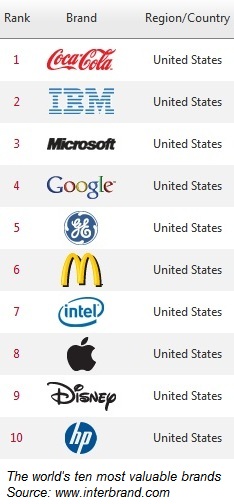 (PROUT Globe, 2011) – The ten most valuable brands in the world last year were American (see table). Of the world’s 100 most valuable brands more than a third were United States-based. [1]
(PROUT Globe, 2011) – The ten most valuable brands in the world last year were American (see table). Of the world’s 100 most valuable brands more than a third were United States-based. [1]
Why is the country’s economy faring so badly then, threatening to throw the entire global economy into a total collapse?
Severe crises seldom have one singular simple cause. The diagnosis of the malaise is usually complex. Still it is possible to single out a few major reasons for the widening economic quagmire that centres on the United States and looks more and more like a worldwide economic depression.
According to Proutist economist Dr. Ravi Batra, a growing wealth gap is the main reason for the present mess. The super-wealthy top companies produce* in order to optimize their profits whereas wages of ordinary people are decreasing in actual terms:
“The main reason is that we don’t have a free enterprise economy. It is touted as a free enterprise economy but we really don’t have that. In fact, what we have are regional monopolies or a monopolized economy. Some people call it ‘Crony Capitalism’. The main feature of a monopolized economy is that the fruit of rising productivity goes to owners of capital, not to the employees.
“So there occurs a rising gap between productivity and wages. Wages are the main source of demand, and productivity is the main source of supply so with the rising gap between wages and productivity there is a potential for a gap between demand and supply. And that has been occurring in the U.S. for many years now. “ [2]
The exploding speculative bubble of the Wall Street economy coupled with the gradual contraction of the economy of the underpaid majority is a sure-fire recipe for economic recession and depression. In the U.S. this reality emerged as the 2008 subprime crisis and in the rest of the world as the ongoing debt crises.
As money has been concentrated in the hands of the few, the rest of the world has indebted itself so colossally to such an extent that nowadays debt has become a regular object of speculative trading.
Capitalist Democracy
 One main reason for the extreme concentration of wealth, that now blocks the circulation of money so that it threatens to bring on an economic depression, is the power that money has come to wield over politics. All over the world large owners of capital have the ability to buy votes by financing elections.
One main reason for the extreme concentration of wealth, that now blocks the circulation of money so that it threatens to bring on an economic depression, is the power that money has come to wield over politics. All over the world large owners of capital have the ability to buy votes by financing elections.
In the words of economic advisor Jay Taylor, “They have positioned themselves to shape laws and regulations to their own advantage so that wages continue to fall behind productivity and hence their own stock market profits continue to rise.”
Professor Batra elaborates:
“That is exactly the way it is all over the world. It takes different forms and shapes in different countries, but in the end it is the power of money over politics that is creating problems. That power has increased sharply from the early 80’s as a result of tax cuts fuelling the wealthy with extra cash, and then a rising wage gap created even more billionaires. These rich people in turn have had an increased ability to buy off elections. So their power has risen very sharply in the U.S. and also in the rest of the world.
So Crony Capitalism is ruling the world. One result of that we have already seen and that is the Asian turmoil. And it is now stirring up in Latin America as well. I think it is finally going to come to the United States.”
Stop Blaming China
In the United States today 14 million people are unemployed with no relief in sight. [3] Political leaders and several economists, including Nobel Prize laureate Paul Krugman, are partly blaming China for the economic condition.
We need to stop blaming China, progressive/minded economic thinker Susmit Kumar says. According to him a main reason why U.S capitalism is bankrupt is the large-scale export of well-paying jobs to cheaper countries overseas, resulting in continuously increasing unemployment and brain drain at home, permanent trade imbalances, and growing economic instability to the disadvantage of the USA.
Instead of blaming others the USA should accept the inevitable: i.e. The collapse of the global trade system, Dr. Kumar says:
“Until the 2008 economic downturn, the administration was able to finance the twin deficits, i.e. budget and trade deficits, by printing dollars, taking the advantage of the dollar being the global currency. During the 1980s and early 1990s, it was mainly Japan who financed the deficits and during the 2000s it is mainly China who is financing the deficits. Now the debt has grown to an unsustainable level.
According to Krugman, China is playing a dangerous game by keeping its currency fixed to dollar and not floating it. Krugman’s suggested surcharge of 25 per cent on Chinese imports is not going to help the economy. Between 2005-7 China allowed 20 per cent appreciation in its currency, but the job losses continued in the USA and the US trade deficit went on increasing during this period. Therefore any appreciation in Chinese currency is not going to help in creating jobs.
China has become the Walmart of manufacturing items, i.e. it imports ingredients/minerals from all over the world, converts them into finished products, and then sells them to the entire world. Since 2001, its foreign exchange reserves is increasing at a tremendous rate, leaving every one behind.
Capitalism is for maximizing profits. Therefore Wall Street, which caused the manufacturing and service jobs to shift offshore, will never allow these jobs to return to the USA.
Also, in the very near future, several countries are going to face a similar crisis. Countries like India, South Africa and Vietnam are becoming consumer countries like the USA and have sizeable trade deficits. Among the BRIC (Brazil, Russia, India, China) countries only India has a trade deficit, which is more than $100 billion a year. In India even Hindu gods are sold stamped with “Made in China.” [4]
With the increasing middle class, the trade deficit of India may even surpass the U.S. trade deficit in the next several years. As Indian currency is not a global currency, there is no way India can finance this amount of trade deficit. Currencies of consumer countries like South Africa and Vietnam depend on foreign investment and at any moment of crisis, their currencies will nosedive. Hence, what we are witnessing is the structural failure of the global trade system,” concludes Dr. Kumar.
* The 30 most valuable brands do not sell essential but semi-essential and non-essential goods. (By essential goods is meant food, clothing, housing, medical, and education.) At 31 we find IKEA, a Netherlands-based affordable furniture company. The multinational food companies, starting with Kellogg’s, gradually appear from 34 onward with the first non-US food giant, France’s Danone, coming in at 51.
Sources
1 Interbrand, The Best Global Brands 2011 http://www.interbrand.com
2 Ravi Batra interviewed by Jay Taylor: “The Crash of the Millennium” www.usagold.com/taylorbatracrash.html
3 United States Unemployment Rate September 2011 http://www.tradingeconomics.com/united-states/unemployment-rate
4 “Stop Blaming China – It is the Structural Failure of the Global Trade System” http://www.susmitkumar.net

Perks for the affluent and social programs for the poor are just tips of ice bergs. The real reasons why global capitalism keeps approaching new breaking points all the time is a) the concentration and mismanagement of wealth, such as allocation of production away from where people need jobs, b) the tremendous gap between purchasing capacity and common needs / requirements, and c) the slowdown in the circulation of resources (money) as the super wealthy choose to wait and see rather than go all in when times are tough and profits expected to be less. The situation can only stabilize when moral, unselfish people take charge backed by people power. More greed, corruption, etc., is not the solution = capitalism need to make room for radically new angles of vision or be forced to drastically transform to the point of its own non-existence.
I would like Dr. Batra, or Dr. Kumar, or another PROUTISTS response to the following:
I’ve heard the main cause of the West’s economic collapse is that the very wealthy receive so many economic “perks” and the “middle and working classes” benefit from so many social programs (social security, government subsidised pensions, health care, etc.) that the Western World’s economies can no longer sustain and maintain these perks and programs. The end result being huge deficits and massive national debts, and ultimately, collapse.
Please respond.
Edmond
Dr. Susmit Kumar’s comments are found here:
http://www.proutglobe.org/2012/05/us-dollars-print-on-demand-and-the-current-budget-and-trade-deficits-drama/